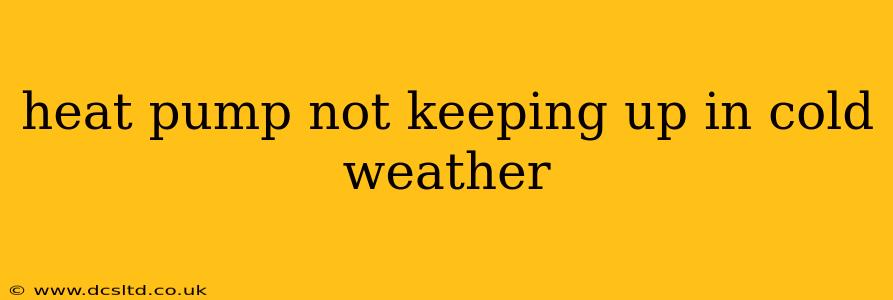Heat pumps are increasingly popular for their energy efficiency, but their performance can falter in extremely cold weather. If your heat pump isn't keeping your home warm enough during a cold snap, you're not alone. This comprehensive guide will explore the common reasons why your heat pump struggles in frigid temperatures and offer practical solutions to restore comfortable warmth.
Why Is My Heat Pump Not Working in Cold Weather?
This is the most common question homeowners have. Several factors can contribute to a heat pump's reduced efficiency in cold weather:
-
Temperature limitations: Heat pumps are designed to operate within a specific temperature range. Below a certain point (often around 25-30°F or -4 to -1°C, but this varies by model), their ability to extract heat from the outside air diminishes significantly. This is because there is less heat available in the outside air to transfer to your home.
-
Frost formation: Ice buildup on the outdoor unit's coils can severely restrict airflow and reduce heat transfer. This is a particularly common problem in humid climates with freezing temperatures.
-
Refrigerant levels: Low refrigerant levels can drastically impact a heat pump's ability to function efficiently. Refrigerant is crucial for the heat transfer process.
-
Defective components: Problems with the compressor, fan motors, or other internal components can prevent the heat pump from operating optimally, especially under the strain of cold weather.
-
Poor insulation and air sealing: Even the best heat pump will struggle if your home isn't properly insulated and sealed. Heat loss through gaps and poorly insulated walls and windows significantly increases the demand on your heat pump.
What Should I Do If My Heat Pump Isn't Heating My Home?
Let's delve into solutions for each potential problem:
1. My Heat Pump is Freezing Up:
Frost buildup is a major culprit. While many modern heat pumps have defrost cycles, severe frost can overwhelm the system. You can try gently brushing off light frost (ensure the power is off first!), but extensive frost indicates a more significant issue requiring professional attention.
2. Is Low Refrigerant the Problem?
You shouldn't attempt to check or refill the refrigerant yourself. Refrigerant is under high pressure, and handling it improperly can be dangerous. If you suspect low refrigerant, call a qualified HVAC technician for a proper diagnosis and repair.
3. My Heat Pump Compressor Isn't Working:
The compressor is the heart of your heat pump. A malfunctioning compressor requires professional repair. Listen for unusual noises – grinding, clicking, or humming – which might indicate a problem.
4. Is My Heat Pump's Fan Malfunctioning?
A faulty fan motor can hinder airflow, reducing efficiency and contributing to freezing problems. Again, professional assessment is crucial for this issue.
5. My Home Isn't Properly Insulated:
Addressing poor insulation and air sealing will improve your heat pump's overall efficiency, regardless of the outside temperature. Consider adding insulation to attics, walls, and floors. Seal any air leaks around windows, doors, and electrical outlets.
6. Should I Use Auxiliary Heat?
Many heat pumps have an electric resistance heating element as a backup. This auxiliary heat kicks in during extremely cold conditions to supplement the heat pump's output. While effective, it's significantly less energy-efficient than the heat pump itself. Use it only when necessary.
How Can I Improve My Heat Pump's Cold Weather Performance?
Proactive measures can greatly improve your heat pump's performance in cold weather:
Regular Maintenance:
Annual inspections and maintenance by a qualified HVAC technician are crucial. Cleaning coils, checking refrigerant levels, and lubricating moving parts will ensure optimal performance and prevent costly repairs.
Proper Sizing:
An improperly sized heat pump – too small or too large – will struggle to heat your home effectively, especially in cold weather. Consult an HVAC professional for sizing recommendations.
When Should I Call an HVAC Technician?
Don't hesitate to contact a qualified HVAC technician if:
- Your heat pump is consistently failing to heat your home adequately, even with the auxiliary heat on.
- You notice unusual noises, smells, or ice buildup.
- Your energy bills have significantly increased.
- You suspect a refrigerant leak.
By understanding the common reasons for heat pump struggles in cold weather and taking proactive steps, you can ensure your home stays warm and comfortable throughout the winter months. Remember, regular maintenance and professional service are key to extending the lifespan and efficiency of your heat pump.
